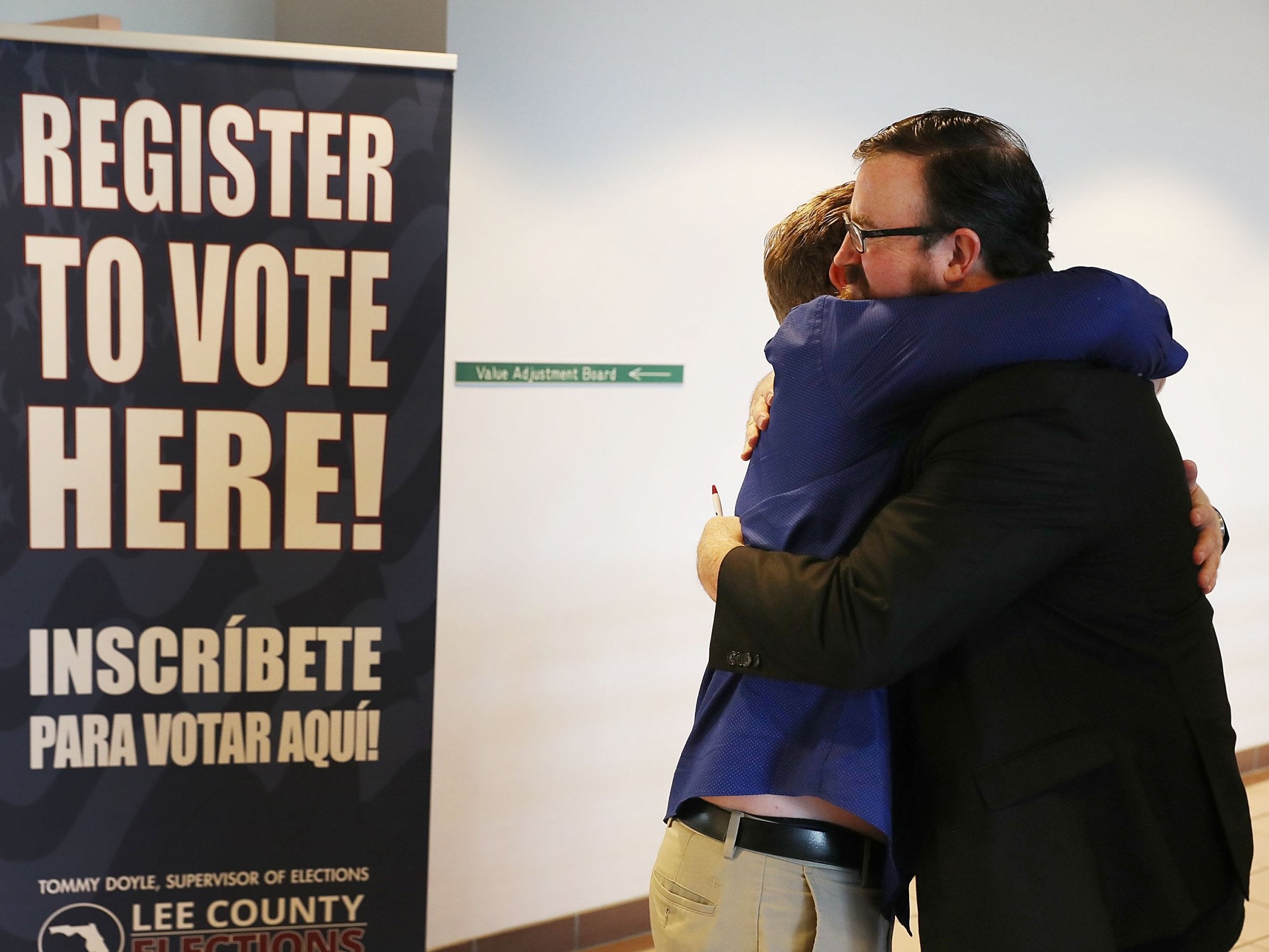1.4 million ex-felons can now register to vote in Florida: 'You can see the expansion of democracy'
Ex-felons tell The Independent the fact they can vote again is a story of American redemption and second chances

Your support helps us to tell the story
From reproductive rights to climate change to Big Tech, The Independent is on the ground when the story is developing. Whether it's investigating the financials of Elon Musk's pro-Trump PAC or producing our latest documentary, 'The A Word', which shines a light on the American women fighting for reproductive rights, we know how important it is to parse out the facts from the messaging.
At such a critical moment in US history, we need reporters on the ground. Your donation allows us to keep sending journalists to speak to both sides of the story.
The Independent is trusted by Americans across the entire political spectrum. And unlike many other quality news outlets, we choose not to lock Americans out of our reporting and analysis with paywalls. We believe quality journalism should be available to everyone, paid for by those who can afford it.
Your support makes all the difference.More than a dozen years after his life began to fall apart, Neil Volz spent the morning eating breakfast and praying with his family at a diner before doing something that would have been impossible just a day earlier: he registered to vote.
The former chief-of-staff to a US congressman who was convicted of fraud 13 years ago is among the more than 1.4 million ex-felons in Florida who can now vote after a historic voter-approved constitutional Amendment 4 came into effect on Tuesday.
After years of campaigning, the final implementation of the law signals a second chance for many and a moment of redemption that celebrates the very fabric of democratic institutions.
“You can see the expansion of democracy in real time, and take part in it. In the process, I just walked away with such gratitude for everyone who helped protect the right to vote, build the right to vote, and just saw it with brand new eyes,” Mr Volz, who helped organise in favour of Amendment 4 alongside the Florida Rights Restoration Coalition, told The Independent.
Mr Volz’s story is at once unique and yet had been representative of a common tragedy that had played out in Florida for years. After his fraud conviction in Washington, he lost his job and family before moving south where he took a job earning the US minimum wage as a janitor.
But, after serving probation, Mr Volz was not allowed to return to the voting booth, even has he remarried and volunteered with faith-based and human rights groups in his community. He had been denied suffrage, just like more than 1.4 million ex-felons in the state – a situation that has now been overturned as Florida voters overwhelmingly approved Amendment 4, with more than 5.1 million people casting ballots in support of the measure.
That was more than one million more votes than either of the leading two candidates for Florida governor.
“It’s really an opportunity for redemption and it’s a celebration of democracy, and love, and second chances,” Rashmi Airan, who pleaded guilty in 2014 to financial crimes and was also involved in the push for Amendment 4, said.
Airan, who will still not be able to vote until the end of her probation and a resolution to a multimillion dollar restitution judgement, continued: “I’m really excited for what’s going to come.”
Amendment 4 became law in spite of remarks from then-governor-elect Ron DeSantis, who said last month that he wanted to wait to implement the measure until the state legislature could reconvene this year. Mr DeSantis became the state’s governor on Tuesday.
But advocates for the measure argued that the amendment was designed to be self-implementing and the measure – which has attracted support from liberal and non-partisan organisations, such as the ACLU of Florida, as well as from groups connected to the conservative Koch Brothers – went ahead on Tuesday with county supervisors registering ex-felons across the state.
Desmond Meade, who has been credited with spearheading the effort behind Amendment, was homeless and struggled with drug addiction 18 years ago, the last time he was convicted of a felony in 2001 on charges related to possessing a firearm as a felon.
But since then, he has focused on giving back to his community and raising a family. The young man who was in and out of trouble with the law is long gone, he said, and replaced by an upstanding American citizen eager to participate in the most fundamental American traditions of going to the ballot box.
On Tuesday, Mr Meade joked with his two children at home before heading to register to vote. He said he felt a sense of awe when he entered the county supervisor’s office, and became a returning citizen with the right to vote in Florida.
To Mr Meade, his story and those of his fellow reformed ex-felons is quintessentially American.
“That’s the story of overcoming obstacles. That’s the story of second chances,” he said.
He continued, referencing the surprise college football victory of Clemson University over the top ranked University of Alabama team on Monday: “Listen, last I checked, this nation has always been one of second chances, and we’ve always loved a good underdog. Everybody is celebrating the Clemson win, and everybody is celebrating Amendment 4.”
Join our commenting forum
Join thought-provoking conversations, follow other Independent readers and see their replies
Comments